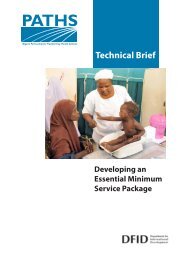PATHS Final programme report: "Togetherness in Health" the Enugu ...
PATHS Final programme report: "Togetherness in Health" the Enugu ...
PATHS Final programme report: "Togetherness in Health" the Enugu ...
Create successful ePaper yourself
Turn your PDF publications into a flip-book with our unique Google optimized e-Paper software.
are managed by an Adm<strong>in</strong>istrator ra<strong>the</strong>r than an appo<strong>in</strong>ted Chairman and have reverted to be<strong>in</strong>gaccountable to <strong>the</strong>ir parent LGA.At <strong>the</strong> time of <strong>the</strong> <strong>in</strong>troduction of <strong>the</strong> <strong>PATHS</strong> <strong>programme</strong> <strong>the</strong> state was under <strong>the</strong> Governorship ofPeople’s Democratic Party (PDP) Governor, Dr. Chimaroke Nnamani. In April 2003 he was re-electedfor a fur<strong>the</strong>r term of office complet<strong>in</strong>g <strong>in</strong> March 2007. Sullivan Chime, <strong>the</strong> previous <strong>Enugu</strong> StateGovernment Attorney General, was elected as Governor <strong>in</strong> April 2007 also under <strong>the</strong> banner of PDP.EmploymentThe state is predom<strong>in</strong>antly agrarian but is regarded as an “educational state” s<strong>in</strong>ce it has apreponderance of primary, secondary and tertiary educational <strong>in</strong>stitutions.The major m<strong>in</strong>eral for which <strong>Enugu</strong> is known worldwide is coal and this gives <strong>the</strong> state <strong>the</strong> sobriquet“Coal City State”. The major employer of labour <strong>in</strong> <strong>the</strong> state is government (local and state), although<strong>the</strong>re is a vibrant private sector made up of ma<strong>in</strong>ly small and medium scale enterprises. In health,some 1,330 staff are employed by <strong>the</strong> M<strong>in</strong>istry of Health with a fur<strong>the</strong>r estimated 3,000 employed bylocal government .Health Status<strong>Enugu</strong> State has a disease burden similar to o<strong>the</strong>r parts of tropical Africa. The most prevalent diseases<strong>in</strong> <strong>the</strong> state are malaria and typhoid fever. However, pregnant women and children are vulnerable to amultitude of health problems, <strong>in</strong>clud<strong>in</strong>g <strong>in</strong> <strong>the</strong> case of women, to high levels of maternal mortality andmorbidity. Except for HIV/AIDS, <strong>the</strong> health <strong>in</strong>dices <strong>in</strong> <strong>Enugu</strong> are better than <strong>the</strong> national <strong>in</strong>dices.Whilst <strong>the</strong> uptake of rout<strong>in</strong>e immunisation <strong>in</strong> <strong>Enugu</strong> is better than many states <strong>in</strong> <strong>the</strong> north of Nigeriait rema<strong>in</strong>s below an acceptable level. By 1990, Nigeria had atta<strong>in</strong>ed globally acceptable immunizationcoverage standards, but <strong>the</strong>se standards were seriously underm<strong>in</strong>ed throughout <strong>the</strong> 1990s by politicaland adm<strong>in</strong>istrative problems and vacc<strong>in</strong>e shortages. In 1999 <strong>the</strong> national coverage for key antigensfor under one year old children were as low as 43% (BCG), 23.4% (DPT3), 18.3% (Polio3) and 35%(measles). However, <strong>the</strong> trend is currently be<strong>in</strong>g reversed. In 2005, <strong>the</strong> follow<strong>in</strong>g coverage estimateswere obta<strong>in</strong>ed for <strong>the</strong> same key antigens <strong>in</strong> <strong>Enugu</strong> – 68.6% (BCG), 53.5% (DPT3), 60.7% (polio3) and62.4% (measles) for under 1 year olds (NICS 2006).10 <strong>PATHS</strong> <strong>F<strong>in</strong>al</strong> Programme Report





